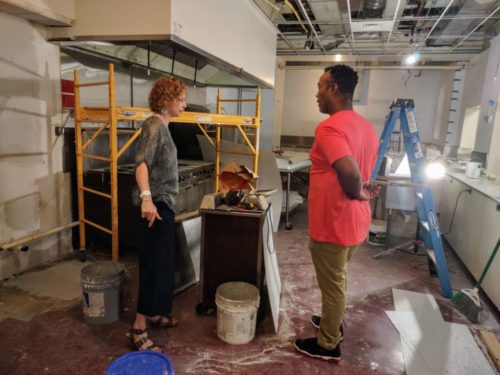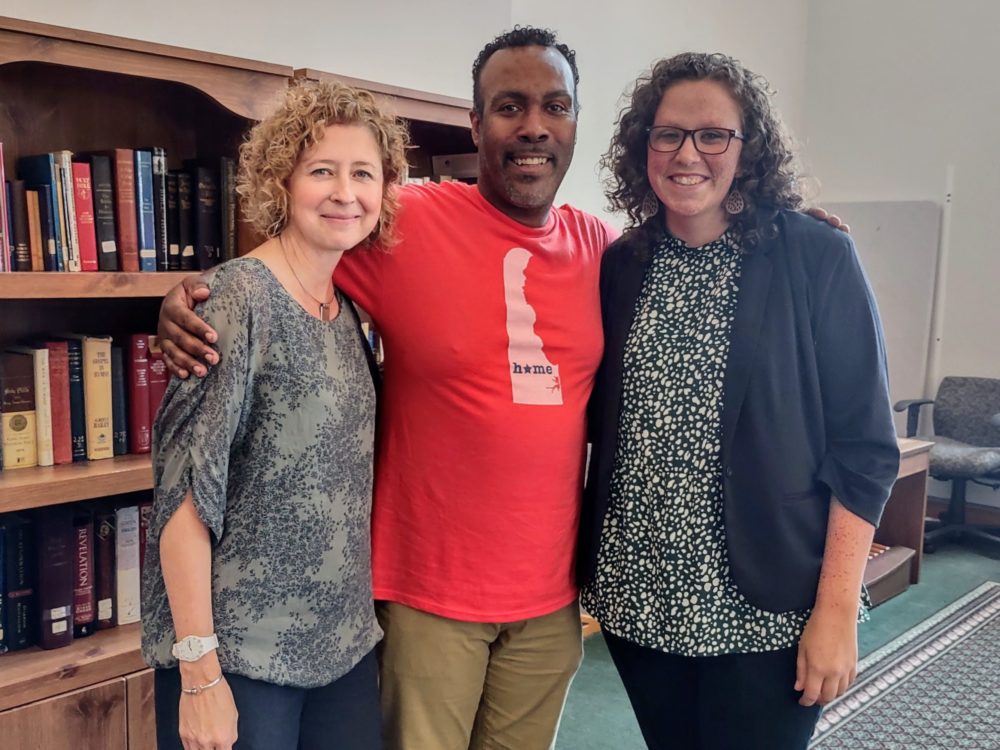When Derrick Allen moved to Claymont from Philadelphia several years ago, he started renovating the kitchen of his fixer-upper by getting rid of its old stove. It turned out to be a few years before he installed a new one, and in the meantime, he cooked everything on his outdoor grill.
When he married his wife, Abena, they decided to cater the reception themselves with a barbecue. So many guests asked who catered it so they could book them, too, that it planted the seed for starting their own barbecue business.
In January 2021, the couple started on the road to starting up DNA Food Services, a food truck and bottled barbecue sauce business.
“Abena is from Tennessee, and we met in Philadelphia, where I’m from,” Allen told Technical.ly. “Our idea is to combine the barbecue that I do with some of her Tennessee flavors.”
After buying a truck and connecting with the Small Business Development Center at the University of Delaware, they learned about the Wilmington Kitchen Collective, a new food industry entrepreneur incubator opening in Grace United Methodist Church in West Center City Wilmington through a community supported partnership with Wilmington Alliance and Riverfront Ministries.
Today the Allens are among the 11 entrepreneurs in the first Kitchen Collective cohort. The actual commercial kitchen in the basement of Grace Church is being completely renovated and will open this summer. In the meantime, the entrepreneurs, including the founders of Veronica’s Kitchen, Signatures by Angell and Iris and Callisto’s Apiary, are getting prepared by completing the complicated process of becoming fully licensed and legal food industry business owners.

In the under-renovation kitchen at Grace Church. (Photo by Holly Quinn)
“We’re working with the Small Business Development Center,” said Laura Semmelroth, director of creative placemaking at Wilmington Alliance and one of the leads of the project. “They’re helping people with business plans, making sure they have all of their licensure, making sure that they have a plan for growth. We also have the Food Bank [of Delaware] that is providing ServSafe certification.”
Then there is the licensure, one of the biggest barriers for small business owners who are just starting out and don’t have a lot of money.
“It can be almost a thousand dollars to get all the licensure you need to have a food business,” Semmelroth said. “Wilmington Alliance and Riverfront Ministries have been working together to fundraise to make sure that we can reimburse folks so that hurdle is cleared for the first year.”
Costs are only part of the challenge, she said, noting that she and project partner Chelsea Spyres, who is Riverfront Ministry’s pastor and executive director, went through the process themselves so they can better help the entrepreneurs.
“Chelsea and I have gone in neck deep to make sure we understood it,” Semmelroth said. “There were certain times when I was like, ‘What? I don’t understand the question, let alone be able to give an answer on this application.’ It’s been helpful to dive in and see how difficult it really is, and just be able to know that we can support folks through that.”
We're not just a commercial kitchen space. It's about the whole person, and the Wilmington Kitchen Collective having a place in the fuller story of West Center City.
“That’s probably one of the best things about the Kitchen Collective,” Allen said. “If you’re doing it all yourself, it’s difficult, but when you do it with help and the person you’re talking to is like, ‘No, you’re right, it is difficult’ — it’s very reassuring to know that it’s not easy.”
The entrepreneurs in the first cohort range from people still at the idea stage to people who have been running their business for a few of years, such as chef Angell Hodges-Morris, founder of the Signatures by Angell food truck and the program’s kitchen manager. If needed, entrepreneurs have the opportunity to take free culinary courses at the Food Bank of Delaware’s Culinary School. Some have received website design and branding advice from UD’s Lerner College. In the future, they may have access to courses in things like graphic design or social media, depending on what the entrepreneurs say they need.
“They’re really at all levels, which goes back to the collective idea, where everybody is going to have an opportunity to learn from each other, everybody is going to have an opportunity to contract from each other,” Semmelroth said.
“We’re not just a commercial kitchen space,” Spyres said. “It’s about the whole person, and the Wilmington Kitchen Collective having a place in the fuller story of West Center City.”
The Kitchen Collective has received support from the city and state, UD, local organizations, the faith-based community and Wilmington’s corporate community, including Corteva.
“Which is not really how it usually goes,” Semmelroth said of the combination of forces that has made it possible. “That’s something I hope to see again and again.”
Grace Church, which is also the home of Serviam Girls Academy and was the base for One Village Alliance before it moved to its Freedom Center, has long been an important part of that story.
“Grace Church made a decision to stay in West Center City after the riots of 1968 as many other churches and homeowners were fleeing the city,” Spyres said. “Grace Church members voted to stay here, and that vote to stay was a vote to have an impact on West Center City.”
With the Wilmington Kitchen Collective, that legacy of place-based collaboration for the good of a community continues.
Before you go...
Please consider supporting Technical.ly to keep our independent journalism strong. Unlike most business-focused media outlets, we don’t have a paywall. Instead, we count on your personal and organizational support.
Join our growing Slack community
Join 5,000 tech professionals and entrepreneurs in our community Slack today!

The person charged in the UnitedHealthcare CEO shooting had a ton of tech connections

From rejection to innovation: How I built a tool to beat AI hiring algorithms at their own game

Where are the country’s most vibrant tech and startup communities?


